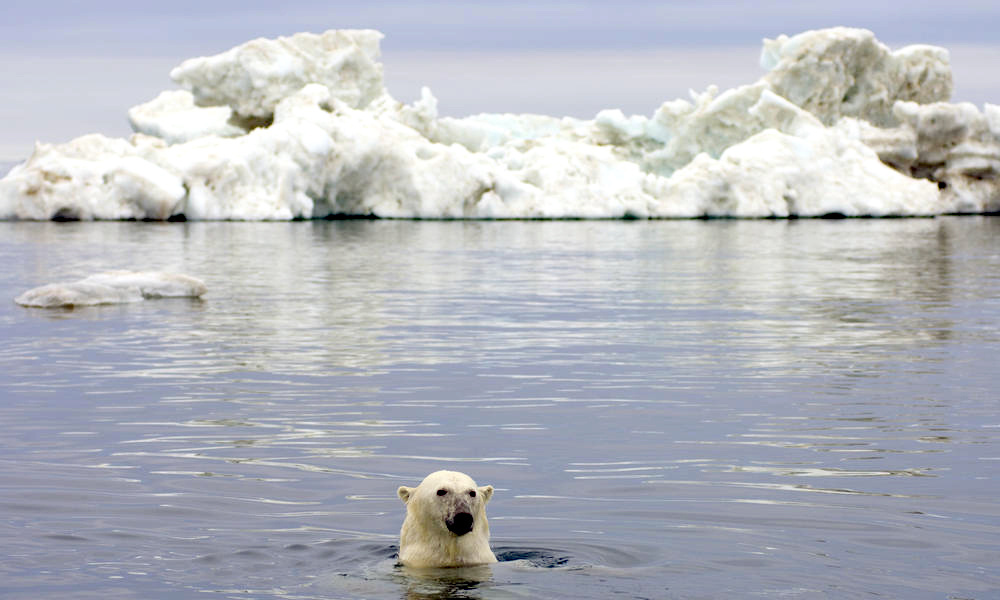

The Trump administration on Wednesday approved a plan submitted by Eni US to drill for oil in the Arctic Ocean, setting the stage for a devastating oil spill in one of the most biologically rich areas in America’s Arctic.
The company, a U.S. subsidiary of the Italian oil and gas giant, has sat on its leases in the Beaufort Sea since acquiring them more than a decade ago. The leases would have expired at the end of this year if Eni did not act on them. The Trump administration provided the public only 21 days to review and comment on the exploration plan and only 10 days to comment on scoping for an environmental assessment under the National Environmental Policy Act.
“Approving this Arctic drilling plan at the 11th hour makes a dangerous project even riskier,” said Kristen Monsell, an attorney with the Center for Biological Diversity. “An oil spill here would do incredible damage, and it’d be impossible to clean up. The Trump administration clearly cares only about appeasing oil companies, no matter its legal obligations or the threats to polar bears or our planet.”
Under the approved plan, Eni US will drill extended reach wells into federal waters in the Beaufort Sea from an existing facility in Alaska state waters. Eni’s proposed wells would be the longest extended reach wells in Alaska, reaching out more than six miles.
The drilling is planned in Harrison Bay next to the Colville River Delta. The area is home to many imperiled marine mammals, including bowhead whales, polar bears and ringed seals. Birds from all over the world, including spectacled eiders and longtailed ducks, spend summers near where Eni will drill.
The Outer Continental Shelf Lands Act requires the Bureau of Ocean Energy Management to reject an exploration plan if it “would probably cause serious harm or damage to life (including fish or other aquatic life)” or to “the marine, coastal or human environment.”
The Center for Biological Diversity and allies submitted comments urging the Trump administration to reject Eni’s draft plan in light of the statutory standard, the risk of devastating oil spills and the fact that drilling in the Arctic will exacerbate the warming already melting the habitat of polar bears and other Arctic wildlife.
Leading climate scientists say the vast majority of untapped fossil fuels, including all Arctic oil resources, must stay in the ground to avoid catastrophic, irreversible changes to the climate. Full development and burning of oil and gas from the Arctic Ocean alone could release nearly 16 billion tons of carbon dioxide into the atmosphere, the equivalent of more than nine years of tailpipe emissions from every car and truck on the road nationwide.
Eni estimates that a large well blowout could result in an oil spill of more than 21 million gallons. Such a spill would be impossible to clean up. The Arctic lacks the infrastructure to mount a response to an oil spill; there are few roads, no deepwater ports and the nearest Coast Guard station is 1,000 miles away.
“The Trump administration ignored the law in rushing to approve dangerous drilling in this remote, beautiful area,” Monsell said. “We’ll fight Trump’s reckless giveaway of our oceans for the sake of polar bears, whales and ice seals and the fragile ecosystems where they live.”
On May 3, the Center for Biological Diversity and other groups filed a lawsuit challenging President Trump’s April 28 executive order purporting to revoke permanent protections for most of the Beaufort Sea and all of the Chukchi Sea from new offshore oil and gas drilling. The lawsuit is pending in federal court in Alaska. Eni’s project is in the part of the Beaufort Sea not included in President Obama’s withdrawal.

 233k
233k  41k
41k  Subscribe
Subscribe 